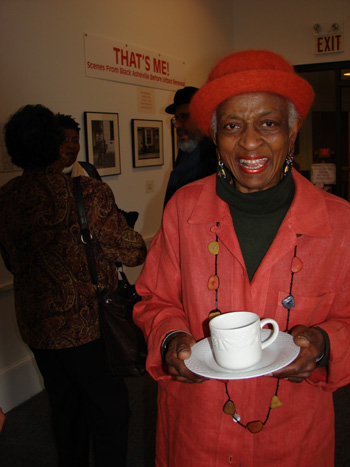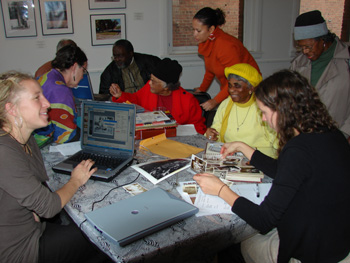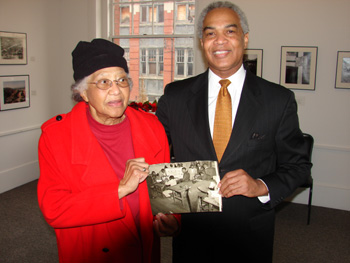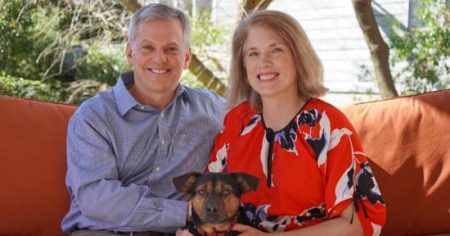‘Gold Nuggets’ Donated to YMI Community Archive
 |
| Ms. Gloria Free, retired educator, community civic leader, and visionary of the Goombay Project enjoys the fellowship at the “Snapshots” afternoon tea. |
“Snapshots” Archive Partnership Kicks Off at YMI Cultural Center.
from staff reports
Photographs Scanned While You Wait – Take All Your Photographs Home With You!
“These are some of those ‘gold nuggets’ of our community history that we want to preserve!” said Mrs. Margaret Fuller, YMI Administrative Assistant, as she viewed precious family photographs brought in for the YMI Community Archive by Mrs.
Thelma Porter and Mrs. Annie Mae Williams. With the Christmas season approaching, Mrs. Fuller asks everyone to remember to share the news about the new archive at family get-togethers during the holidays. Family photos from past holidays would be welcome additions to the archive.
Respected elders of the Asheville African American community, local journalists, historians, librarians, scholars, and students attended a Tea for “That’s Me,” the opening event for “SNAPSHOTS,” a partnership between the YMI and Buncombe County Public Libraries to create at the YMI a public archive of Asheville’s African American history. Both institutions will hold digital copies of archived materials.
Photographs, oral histories, and other materials shared with the new
archive will be a unique and valuable resource for generations to come.
Sparked by the exhibit of Andrea Clark’s East End photographs
and the “That’s Me” exhibit at the YMI, this project will collect
family photographs and the stories that come with them to enlarge the
understanding and appreciation of African American history in Asheville
and build an enduring legacy.
Surveying the lively discussion as attendees perused the
photographs, YMI Director Harry Harrison commented, “Collecting stories
and photographs from elders in the community is an important archival
responsibility for the YMI. We’re happy with the response thus far and
we anticipate gathering more of these sensitive and personal stories
about African American life and culture in Asheville.”
 |
| Students from UNC-A in collaboration with Pack Library, the YMI Cultural Center, and the Asheville Arts Council enjoy an ‘afternoon tea’ with local senior citizens while working on a pictorial history of Asheville’s African American communities before urban renewal. |
Commenting on the SNAPSHOTS partnership, Library Director Ed
Sheary said, “We welcome this opportunity to expand the historic record
of these important local communities. Their inclusion in our public
library’s archives insures that these materials will always be
available to the communities themselves and all others attempting to
learn and describe the truth of the lives of those who lived in these
neighborhoods.”
Bennie Lake, another early contributor to the new archive, had
this to say about the project: “I think this is very important from the
historical standpoint. These pictures show how the community was when
we were growing up, and can give some real insight to our youth about
how our community used to be and how close people were then. These
photographs also make people remember what was taken away through urban
renewal.”
Dr. Ken Betsalel, of the Political Science Department at UNC
Asheville, said, “This tea is a wonderful opportunity for my students
to work with ‘story holders’ in the community. Listening to stories and
looking through photo albums, they are learning first-hand the
importance of family, love, and community.”
Of particular interest for the new archive are photographs and
memories relating to the Urban Renewal experience in Asheville. By one
estimate, 1600 black neighborhoods across the United States were
demolished by Urban Renewal programs, beginning in the 1950s. Black
neighborhoods in Asheville were not spared. Dr. Betsalel also noted,
“My students are learning that each person, each family, and each
neighborhood in our city matters, and that when homes and businesses
were displaced through Urban Renewal there resulted a real and enduring
sense of loss. They have begun to understand that when local
governments plan for the future they need to consider the unintended
consequences as well as the intended consequences of their actions.”
 |
| Ms. Annie Williams and Harry Harrison, Director of the YMI Cultural Center, hold a photo of young men repairing radios in a 1950s electronic class. The classes were offered by the G.I. Bill and held in the old Broom Factory building on Valley Street. |
Dr. Betsalel’s “Civic Engagement in the Community” class,
working with YMI Director Harrison, has been meeting at the YMI once a
week this semester listening to the stories of elders and other “story
holders” in the African American community as they explain what life
was like before and after Urban Renewal.
Here’s how SNAPSHOTS “Scanning Days” work: Community members can
bring family photos to the YMI, where they will be scanned and
catalogued for the archive by library and YMI staff while the owner
waits. Scanning a photograph takes about 5 to 10 minutes per photo,
including time required to record information including the donor’s
name and contact information and information about the photograph.
All photographs will be returned. Large volumes of photos, such
as scrapbooks, may be scanned by appointment. For details on accessing
the new archive, contact the YMI.
The season of sharing and giving is here. What priceless image can you share with the YMI Community Archive?
Upcoming Scanning Days at the YMI – Mark Your Calendar!
• Saturday, January 10, 2009 2-4 p.m.
• Saturday, February 21, 2009 2-4 p.m.
For more information, or to schedule an appointment, call the YMI at 252-4614.







